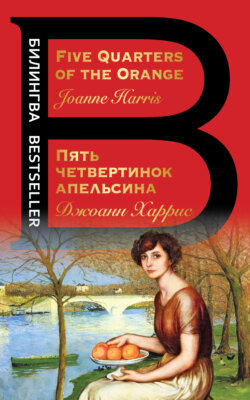Читать книгу Five Quarters of the Orange / Пять четвертинок апельсина - Джоанн Харрис, Joanne Harris - Страница 36
Joanne Harris
Five Quarters of the Orange
Part Three
The snack-wagon
10
ОглавлениеAfter that our enthusiasm for Tomas’s cause redoubled. Any piece of information, however trivial, was grist to his mill. Madame Henriot at the post office was opening mail in secret, Gilles Petit at the butcher was selling cat meat and calling it rabbit, Martin Dupré had been heard speaking against the Germans in La Mauvaise Réputation with Henri Drouot, everyone knew the Truriands had a radio hidden under a trap in their back garden and that Martin Francin was a Communist, and day by day he would visit these people with the excuse of collecting supplies for the barracks and would leave with a little more than he came for, a pocketful of notes or some black market cloth or a bottle of wine… Sometimes his victimspaid with more information; a cousin from Paris hiding in a cellar in downtown Angers, or a stabbing behind Le Chat Rouget. By the end of summer Tomas Leibniz knew half the secrets in Angers and two thirds of those in Les Laveuses, and he already had a small fortune tucked away in his mattress in the barracks. “Fighting back,” he called it. Against what, he never needed to say.
He was sending money home to Germany, though I never knew how. There were ways, of course. Diplomatic bags and couriers’ cases. Food trains and hospital trucks. Plenty of ways for an enterprising young man to exploit, given the right contacts. He exchanged duties with friends in order to visit local farms. He listened at the door of the officers’ mess. People liked Tomas, trusted him, talked to him. And he never forgot anything.
It was risky. He told me as much, meeting me one day down by the river. If he made a mistake he might be shot. But his eyes were bright with laughter as he told me. Only a fool gets caught, he said, grinning. A fool gets slack and careless, greedy too, perhaps. Heinemann and the others were fools. He’d needed them once, but now it was safer to play alone. Liabilities, all of them. Too many weaknesses-fat Schwartz had an eye for the girls, Hauer drank to excess and Heinemann, with his constant scratching and nervous tics, seemed a prime candidate for the sanatorium. No, he said lazily, lying on his back with a clover stem between his teeth, it was better to work alone, to watch and wait and let others take the big risks.
“Take your pike,” he said reflectively. “It hasn’t lived so long in the river by taking risks all the time. It’s a bottom feeder most of the time, even though its teeth allow it to tackle just about any fish on the river.” He paused to discard the clover stem and to pull himself into a seated position overlooking the water. “It knows it’s being hunted, Backfisch, so it waits on the bottom, eating bits of rotted stuff and sewage and mud. From the bottom, it’s safe. It watches the other fish, the smaller ones, closer to the surface, sees their bellies reflecting the sun, and when it sees one a little farther from the rest, maybe one in trouble-whap!”
He demonstrated with a rapid movement of the hands, closing imaginary jaws on the invisible victim.
I watched him with wide eyes.
“It keeps away from traps and nets. It knows them by sight. Other fish get greedy, but the old pike just bides its time. It knows to wait. And the bait… it knows that too. Lures don’t work for the old pike. Live bait’s all it will take, and even then only sometimes. Takes a clever man to catch a pike.” He smiled. “You and I could both learn a few lessons from an old pike like that, Backfisch.”
Well, I took him at his word. I met him once a fortnight or even once a week, once or twice alone, more often the three of us. It was usually a Thursday, and we met by the Lookout Post and went into the woods or downriver away from the village, where no one would see us. Often Tomas wore civilian clothing, leaving his uniform hidden so that no one would ask questions. On Mother’s bad days I used the orange bag to keep her to her room while we met Tomas. On all other days I rose at four thirty every morning and fished before the morning’s chores began, taking care to choose the darkest and quietest parts of the Loire. I caught live bait in my cray pots, keeping them alive and trapped until I could use them to bait my new rod. Then I skimmed them across the water, just lightly enough for their pale bellies to touch the surface, raking the current with the living lure. I caught several pike that way, but they were all youngsters, none of them much longer than a hand or a foot. I pinned them to the Standing Stones all the same, with the stinking strips of water snake that had hung there all that summer.
Like the pike, I waited.
